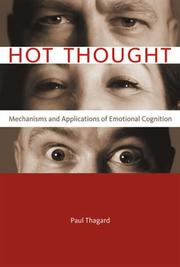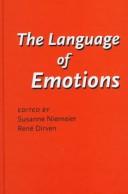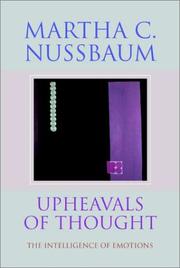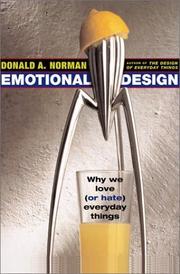| Listing 1 - 8 of 8 |
Sort by
|

ISBN: 026220164X 0262701243 9786612098468 0262284847 1282098462 1429410027 9780262201643 0262303469 9780262284844 9781282098466 9780262701242 9781429410021 6612098465 9780262303460 Year: 2006 Publisher: Cambridge, Mass. MIT Press
Abstract | Keywords | Export | Availability | Bookmark
 Loading...
Loading...Choose an application
- Reference Manager
- EndNote
- RefWorks (Direct export to RefWorks)
"In Hot Thought, Paul Thagard describes the mental mechanisms - cognitive, neural, molecular, and social - that interact to produce different kinds of human thinking, from everyday decision making to legal reasoning, scientific discovery, and religious belief, and he discusses when and how thinking and reasoning should be emotional." "Thagard argues that an understanding of emotional thinking needs to integrate the cognitive, neural, molecular, and social levels. Many of the chapters employ computational models of various levels of thinking, including HOTCO (hot cognition) models and the more neurologically realistic GAGE model. Thagard uses these models to illuminate thinking in the domains of law, science, and religion, discussing such topics as the role of doubt and reasonable doubt in legal and other contexts, valuable emotional habits for successful scientists, and the emotional content of religious beliefs. Identifying and assessing the impact of emotion, Thagard argues, can suggest ways to improve the process of reasoning."--Jacket.
Book

ISSN: 12698644 ISBN: 9782753580565 2753580561 2753585407 Year: 2021 Publisher: Rennes : Presses universitaires de Rennes,
Abstract | Keywords | Export | Availability | Bookmark
 Loading...
Loading...Choose an application
- Reference Manager
- EndNote
- RefWorks (Direct export to RefWorks)
La neutralité, en science comme ailleurs, est un vœu pieux, voire un leurre, à mieux comprendre, si ce n’est évaluer ou contrôler. Surtout, l’engagement sur un terrain d’études conduit à des surprises, voire à des déconvenues qui font le sel des ouvrages de N. Barley comme par exemple L’anthropologue en déroute (2001). Dans le cadre des approches sensibles en sciences humaines et sociales, les émotions ressenties par le corps, recueillies et partagées, avec plaisir ou déplaisir, ne sont plus considérées comme des perturbateurs de l’analyse mais comme des sésames d’accès à la compréhension humaine. Elles s’imposent à la chercheuse ou au chercheur, la/le surprennent ; elles deviennent des guides utiles, des opératrices d’inclinaisons, voire de bifurcations, dans la recherche scientifique. Longtemps délaissées, les émotions ne constituent plus un obstacle à la rationalité mais un échafaudage à l’avènement d’une orientation théorique spécifique plutôt qu’une autre, à une modification d’attitude sur le terrain, etc. Émotion et cognition sont, pour le pire et le meilleur, définitivement intriquées.
Émotions. --- Affect (psychologie). --- Sciences sociales --- Sciences humaines --- Recherche. --- Émotions. --- Affect (psychologie) --- Emotions --- Affect (Psychology) --- Social sciences --- Research. --- Émotions et cognition --- Émotions --- Recherche --- Aspect psychologique --- Sciences sociales - Recherche --- Sciences humaines - Recherche --- Émotions - Aspect psychologique --- Sociology --- sociologie --- émotion --- chercheur

ISBN: 902722160X 1556195141 9786613174765 1283174766 9027283893 9789027221605 9789027283894 9781556195143 Year: 1997 Publisher: Amsterdam Philadelphia John Benjamins
Abstract | Keywords | Export | Availability | Bookmark
 Loading...
Loading...Choose an application
- Reference Manager
- EndNote
- RefWorks (Direct export to RefWorks)
Since the celebration of the 100th anniversary of Darwin's The Language of the Emotions in Man and Animals (1872), emotionology has become a respectable and even thriving research domain again. The domain of human emotions is most important for mankind, emotions being right in the center of our daily lives and interests. A key-role in the interdisciplinary scientific debate about emotions has now been accorded to the study of the language of emotions.The present volume offers a new approach to the study of the language of emotions insofar as it presents theories from very differen
Langage et emotions --- Communication non-verbale (Psychologie) --- #SBIB:309H53 --- #SBIB:309H505 --- Niet-verbale communicatie --- Code en boodschap: psychologische, psycho-analytische benadering --- Psycholinguistics --- Sociolinguistics --- Emotions --- Emotions et cognition --- Communication interpersonnelle --- Aspect sociologique --- Emotions and cognition --- Interpersonal communication --- Body language --- Congresses --- Sociological aspects --- Congresses. --- Congrès --- Language and emotions --- Feelings --- Human emotions --- Passions --- Psychology --- Affect (Psychology) --- Affective neuroscience --- Apathy --- Pathognomy --- Cognition and emotions --- Cognition --- Emotions - Congres. --- Emotions et cognition - Congres. --- Emotions - Aspect sociologique - Congres. --- Langage et emotions - Congres. --- Communication interpersonnelle - Congres.
Periodical
Abstract | Keywords | Export | Availability | Bookmark
 Loading...
Loading...Choose an application
- Reference Manager
- EndNote
- RefWorks (Direct export to RefWorks)
Cognition & Emotion is devoted to the study of emotion, especially to those aspects of emotion related to cognitive processes. The journal aims to bring together work on emotion undertaken by researchers in cognitive, social, clinical, and developmental psychology, neuropsychology, and cognitive science. Examples of topics appropriate for the journal include the role of cognitive processes in emotion elicitation, regulation, and expression; the impact of emotion on attention, memory, learning, motivation, judgements, and decisions; the interplay between cognition and emotion in psychopathology, social behaviour, and health-related behaviours; cultural, developmental, psychophysiological, and neuropsychological aspects of the relation between cognition and emotion; and the nature of particular emotions or emotionality in general. Cognition & Emotion publishes theoretical papers, original research reports, and literature reviews. Submissions can be considered for publication as regular articles or brief reports.
Psychology --- Cognition --- Emotions --- Emotions and cognition --- Emotions et cognition --- Periodicals. --- Périodiques --- Intelligence émotionnelle --- Périodiques. --- Cognition. --- Emotions and cognition. --- Emotions. --- Cognitive Science. --- Arts and Humanities --- Philosophy --- Neurology --- Psychiatry & Psychology --- Anthropology --- General and Others --- Sociology. --- Health Sciences --- Social Sciences --- Sociology --- Arts and Humanities. --- Health Sciences. --- Social Sciences. --- Psychology. --- Regret --- Feelings --- Emotion --- Feeling --- Regrets --- Cognitive Function --- Cognitions --- Cognitive Functions --- Function, Cognitive --- Functions, Cognitive --- Cognition and emotions --- Cognitive Sciences --- Science, Cognitive --- Sciences, Cognitive --- Cognitive Science
Book
ISBN: 9780262019958 9780262318419 9780262533768 0262318415 0262019957 0262318423 9780262318426 Year: 2013 Publisher: Cambridge, MA
Abstract | Keywords | Export | Availability | Bookmark
 Loading...
Loading...Choose an application
- Reference Manager
- EndNote
- RefWorks (Direct export to RefWorks)
In The Feeling Body, Giovanna Colombetti takes ideas from the enactive approach developed over the last twenty years in cognitive science and philosophy of mind and applies them for the first time to affective science -- the study of emotions, moods, and feelings. She argues that enactivism entails a view of cognition as not just embodied but also intrinsically affective, and she elaborates on the implications of this claim for the study of emotion in psychology and neuroscience. In the course of her discussion, Colombetti focuses on long-debated issues in affective science, including the notion of basic emotions, the nature of appraisal and its relationship to bodily arousal, the place of bodily feelings in emotion experience, the neurophysiological study of emotion experience, and the bodily nature of our encounters with others. Drawing on enactivist tools such as dynamical systems theory, the notion of the lived body, neurophenomenology, and phenomenological accounts of empathy, Colombetti advances a novel approach to these traditional issues that does justice to their complexity. Doing so, she also expands the enactive approach into a further domain of inquiry, one that has more generally been neglected by the embodied-embedded approach in the philosophy of cognitive science.
Cognitive psychology --- Philosophical anthropology --- Affective and dynamic functions --- Emotions and cognition. --- Affective neuroscience. --- Philosophy of mind. --- Emotions et cognition --- Neuroscience affective --- Philosophie de l'esprit --- Affective neuroscience --- Emotions and cognition --- Philosophy of mind --- Mind, Philosophy of --- Mind, Theory of --- Theory of mind --- Philosophy --- Cognitive science --- Metaphysics --- Cognition and emotions --- Cognition --- Neurobiology of emotion --- Neuroscience of emotions --- Physiology of emotion --- Neuropsychology --- Emotions --- PHILOSOPHY/Philosophy of Mind/General --- COGNITIVE SCIENCES/General

ISBN: 1316084744 110708461X 1107100593 1107088747 1107094941 0511840713 9781107088740 9780511840715 9781107094949 9781299771932 1299771939 9780521462020 0521462029 9780521531825 0521531829 9781316084748 9781107100596 9781107084612 Year: 2001 Publisher: Cambridge New York
Abstract | Keywords | Export | Availability | Bookmark
 Loading...
Loading...Choose an application
- Reference Manager
- EndNote
- RefWorks (Direct export to RefWorks)
"Emotions shape the landscape of our mental and social lives. Like geological upheavals in a landscape, they mark our lives as uneven, uncertain and prone to reversal. Are they simply, as some have claimed, animal energies or impulses with no connection to our thoughts? Or are they rather suffused with intelligence and discernment, and thus a source of deep awareness and understanding? In this compelling book, Martha C. Nussbaum presents a powerful argument for treating emotions not as alien forces but as highly discriminating responses to what is of value and importance. She explores and illuminates the structure of a wide range of emotions, in particular compassion and love, showing that there can be no adequate ethical theory without an adequate theory of the emotions. This involves understanding their cultural sources, their history in infancy and childhood, and their sometimes unpredictable and disorderly operations in our daily lives."--
Emotions and cognition. --- Emotivism. --- Emotions and cognition --- Emotivism --- Social Sciences --- Psychology --- Emotive theory of ethics --- Ethics, Emotive theory of --- Ethics --- Cognition and emotions --- Cognition --- 17.024.2 --- Emotionele grondslagen van de ethiek. Gevoel. Intuïtie --- Affective and dynamic functions --- Cognitive psychology --- Social ethics --- 17.024.2 Emotionele grondslagen van de ethiek. Gevoel. Intuïtie --- #KVHA:Emoties --- #KVHA:Ethiek --- #KVHA:Psycholinguïstiek --- #KVHA:Sociolinguïstiek --- #KVHA:Taalkunde --- Emotions. --- Emotions --- Emotions et cognition --- Arts and Humanities --- Philosophy

ISBN: 0521641632 9780521641630 0511155387 0511303866 0511051611 0511175183 1280420391 1107116236 0511015933 9780511015939 9780511175183 0521541468 9780521541466 9780511051616 2735108333 9782735108336 9786610420391 6610420394 9780511155383 Year: 2000 Volume: *5 Publisher: Cambridge, U.K. New York Paris Cambridge University Press Editions de la Maison des Sciences de l'homme
Abstract | Keywords | Export | Availability | Bookmark
 Loading...
Loading...Choose an application
- Reference Manager
- EndNote
- RefWorks (Direct export to RefWorks)
How human emotions are 'constructed' from individuals' embodied experiences in different cultural settings.
Psycholinguistics --- Affective and dynamic functions --- Sociolinguistics --- Emoties en cognitie --- Emotions and cognition --- Emotions et cognition --- Langage et émotions --- Language and emotions --- Taal en emoties --- Émotions --- Linguistique cognitive --- Language and emotions. --- Emotions and cognition. --- Emotions --- Sociologie --- Sociological aspects. --- Emoties --- Emoties en cognities --- Interpersoonlijke communicatie --- Uitdrukking van emoties en cultuur --- sociale aspecten --- Emoties en cognities. --- Interpersoonlijke communicatie. --- Taal en emoties. --- Uitdrukking van emoties en cultuur. --- sociale aspecten. --- Emotions - Sociological aspects. --- Psychology --- Social Sciences --- Sociological aspects --- Sociology of emotions --- Cognition and emotions --- Emotions and language --- Sociology --- Cognition --- Linguistique cognitive. --- Sociologie. --- Emotions - Sociological aspects --- Émotions

ISBN: 0465051359 0465051367 9780465051359 9780465051366 Year: 2005 Publisher: New York : BasicBooks,
Abstract | Keywords | Export | Availability | Bookmark
 Loading...
Loading...Choose an application
- Reference Manager
- EndNote
- RefWorks (Direct export to RefWorks)
Did you ever wonder why cheap wine tastes better in fancy glasses? Why sales of Macintosh computers soared when Apple introduced the colorful iMac? New research on emotion and cognition has shown that attractive things really do work better, as Donald Norman amply demonstrates in this fascinating book, which has garnered acclaim everywhere from Scientific American to The New Yorker.Emotional Design articulates the profound influence of the feelings that objects evoke, from our willingness to spend thousands of dollars on Gucci bags and Rolex watches, to the impact of emotion on the everyday objects of tomorrow.Norman draws on a wealth of examples and the latest scientific insights to present a bold exploration of the objects in our everyday world. Emotional Design will appeal not only to designers and manufacturers but also to managers, psychologists, and general readers who love to think about their stuff.
Production management --- Consumer behavior --- Affective and dynamic functions --- Design --- Emotions and cognition --- Industrial design --- #KVHA:Cognitieve linguïstiek --- #KVHA:Meertalige communicatie --- #KVHA:Semiotiek --- #KVHA:Taalkunde --- 415.3 --- 770.6 --- emoties --- productdesign --- psychologie --- Design, Industrial --- Mechanical drawing --- New products --- Cognition and emotions --- Cognition --- Creation (Literary, artistic, etc.) --- Psychological aspects --- algemene psychologie, uitvoerende functies --- productdesign, filosofie, esthetiek en kritiek --- designfilosofie --- Emotions and cognition. --- Psychological aspects. --- Emotions et cognition --- Aspect psychologique --- Psychische functies --- Productiebeleid --- Consumentengedrag --- design --- designpsychologie --- lifestyle --- industrieel design --- 745 --- CAD, design en industriële vormgeving --- Design - Psychological aspects --- Industrial design - Psychological aspects --- Design industriel
| Listing 1 - 8 of 8 |
Sort by
|

 Search
Search Feedback
Feedback About UniCat
About UniCat  Help
Help News
News